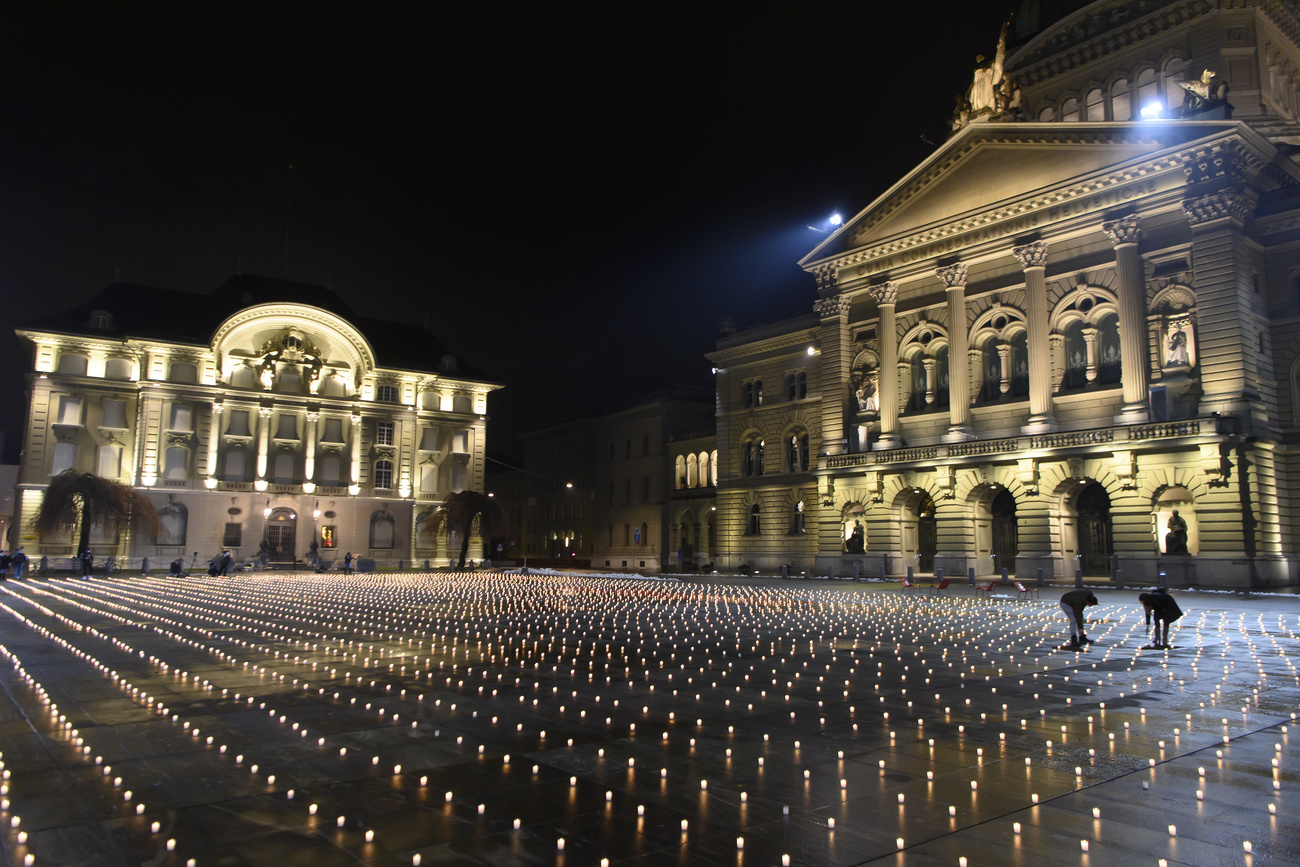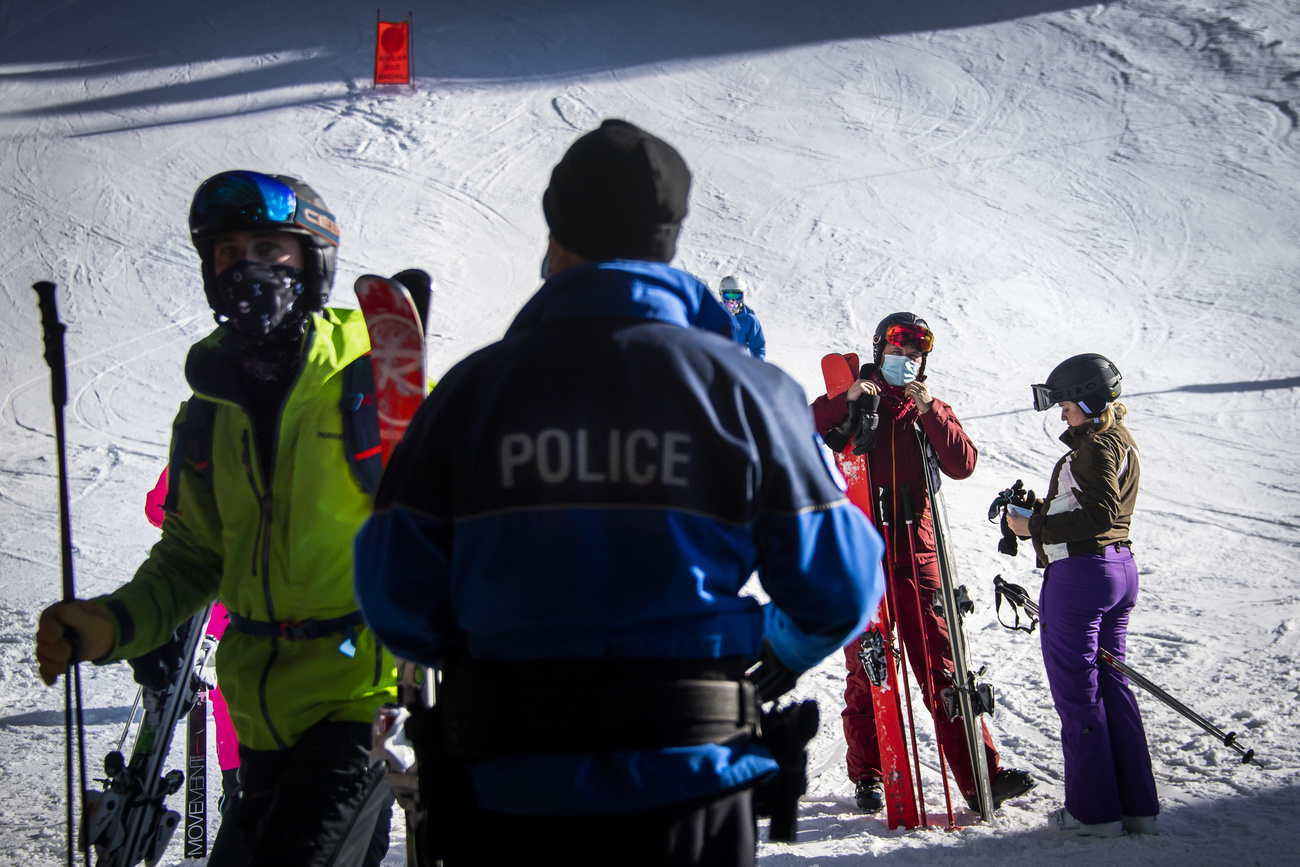Grim Covid milestone sparks emotional outpouring in Switzerland

Switzerland now has surpassed the tragic milestone of 5,000 Covid deaths. This has caused a wave of emotions across the country, including anger, especially in the press and on social media.
Thousands of candles in memory of the victims of the virus have been lit on Federal Square, in the Swiss capital Bern, regularly since mid-November, in a private initiative.
Since last weekend candles can also be seen virtually, thanks to the Swiss media giant Tamedia. The Tages-Anzeiger, Basler- and Berner Zeitung, Bund, 24 Heures, Tribune de Genève all have 60 pages of candles onlineExternal link – red for women, blue for men – on their websites. Most candles remain anonymous, but sometimes there’s a name and an age or a quote from a death notice, perhaps a small note from a relative.
Tamedia editorial staff said that they wanted to show “the true story behind the numbers”. “Sometimes we feel like we are on another planet,” they wrote. “While politicians and tourism experts fight in public about how many people should go in gondolas in ski areas, people are telling us how they said goodbye forever on the telephone…”
Without candles, the online independent magazine Republik has also been decrying the gap between the epidemiological situation, individual suffering and the preoccupations of the authorities.
“The government announces minimalist measures against Covid, but the ski resorts get their Christmas business. Just what are the values that remain non-negotiable in Switzerland?” asked the journalist Daniel Binswanger.
‘Obscenity’
Shocked that a country that is registering 500 deaths a week believes skiing is the only “national emergency”, Republik also expressed its dismay over celebrations that took place mid-session in the Swiss parliament.
At the beginning of November parliamentarians marked in succession both the new Senate president and cabinet minister Ueli Maurer’s birthday with music, singing and limited mask-wearing, which provoked an avalanche of strong reactions – poking fun and outrage – on social media.
The Swiss parliament gathering and singing happy birthday during a pandemic.
— Daniel Probst (@skepteis) December 1, 2020External link
Also: How many people without masks can you count? https://t.co/4lttb9MAweExternal link
Binswanger described it as “obscene”. “This total lack of shame is an instrument of power that Donald Trump has taken to a new level of perfection. And in Switzerland too health policy has also reached a phase of obscenity,” concluded the editorial.
The tabloid Blick was also shocked and reminded readers what had been signed off in that very same building: “wearing masks, social distancing, no sports training, no choir practice, no birthdays, no bars, no clubs, no parties: 2020 is a year of doing without and solidarity.”
Under these conditions, the newspaper said, politicians should at the very least “conform strictly to the rules that they have imposed on everyone else”. And in the spirit of Christmas as “the celebration of love thy neighbour” which this year means “a voluntary renouncing”.
Swiss visible everywhere
The health situation and especially the war over ski resorts has attracted a lot of international press interest as well. In Germany, Austria, Italy and France, the media have reported on Bern’s decision to keep resorts open despite opposing decisions from Paris, Rome and Berlin. Often the reporting is purely factual but there are a few underlying clichés of a selfish Switzerland that is taking advantage of the situation.
“Could it be Switzerland, which is geographically in the middle of warring EU countries, but which is not linked by their agreements, that in the end will have the last laugh?” asked Germany’s Der Spiegel magazine.
Radio France Culture was more direct, given that the French have been forbidden from coming to ski in Switzerland, saying: “For decades Switzerland has been welcoming fraudsters – where it was once tax fraudsters, now its ski fraudsters.”
For its part, French magazine Le Point reminded readers of the case of the Ischgl ski resort in Austria, where 10,000 European tourists are said to have been infected with the virus at the beginning of the pandemic. “If such a catastrophe happened at Zermatt, Gstaad, Davos or Verbier, there would be long-lasting damage to Switzerland’s image,” it said.
Half full or half empty?
French daily Le Figaro was among those who had harsh words for how the second wave was developing. “Excessive optimism, an inefficient strategy, overwhelmed cantons and a passive Swiss government. This is how Switzerland has changed from good pupil to wearing the dunce’s cap in the fight against the coronavirus,” it wrote.
But some saw positive aspects. The 5,500 victims since March was certainly two or three times more than in Austria or Germany in terms of population, but a lot less than Belgium, France, the United Kingdom, Italy, the United States and France.

More
Coronavirus: the situation in Switzerland
This led German tabloid Bild, for example, to ask if there had been a “corona miracle of Bern” because the country was “going through a second wave without a lockdown”. It was even “managing a turnaround”, as the Austrian daily Kurier put it.
There was a positive verdict from Britain’s The Telegraph and the American New York Post, which highlighted the flattening of the curve since the end of November and the virtues of federalism. “Instead of implementing a nationwide lockdown, the Swiss government has largely left restrictions up to individual regions [cantons] to decide,” the outlets reported. This “Swiss special way” had worked, they said.
This is a view that is close to that of Switzerland’s own Neue Zürcher Zeitung newspaper, which is also convinced of the virtues of federalism. “But this approach only works when the cantons take their responsibility onboard,” it said.

In compliance with the JTI standards
More: SWI swissinfo.ch certified by the Journalism Trust Initiative













Join the conversation!